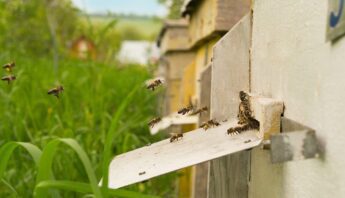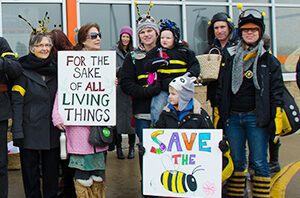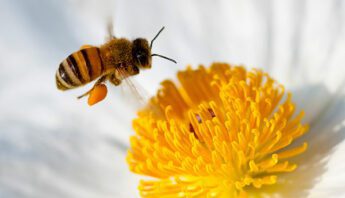For Immediate Release
October 16, 2014
Contact: Paul Towers, 916-216-1082, ptowers@panna.org
 Earlier today, the U.S. Environmental Protection Agency (EPA) announced partial findings from its assessment of neonicotinoid pesticides commonly used as coatings on soybeans, corn, wheat, cotton and other commodity crops throughout the United States. The pesticides have been linked to a wide range of impacts on pollinators and are a driving factor in bee population declines.
Earlier today, the U.S. Environmental Protection Agency (EPA) announced partial findings from its assessment of neonicotinoid pesticides commonly used as coatings on soybeans, corn, wheat, cotton and other commodity crops throughout the United States. The pesticides have been linked to a wide range of impacts on pollinators and are a driving factor in bee population declines.
EPA’s Jim Jones summarized the Agency’s findings by saying: "These seed treatments provide little or no overall benefits to soybean production in most situations." The report also noted, “In comparison to the next best alternative pest control measures, neonicotinoid seed treatments likely provide $0 in benefits to growers…”
These findings were limited to soybeans. At least 30% of soybean seeds planted annually (approximately 22.5 million of 75 million acres) are pretreated with neonicotinoid insecticides (two of the primary four, imidacloprid and thiamethoxam). Seed treatment applications are prophylactic, used regardless of any evidence of pest pressures that would be addressed through early-season neonicotinoid use. Millions of acres of other commodity crops, especially corn, are similarly pre-treated with neonicotinoids.
Emily Marquez, PhD, staff scientist for PAN, released the following statement:
“EPA has confirmed what farmers, beekeepers and scientists have been saying all along: neonicotinoids do more harm than good. Bayer and Syngenta’s products are unreliable and don’t increase yield, forcing farmers to buy pre-treated products without their consent and with little benefit.
Not only do neonics provide little protection against pests, they pose serious threats to bees and other pollinators that support the food system. Independent global scientists have concluded that neonics, on top of existing stressors, are driving bee declines.
EPA’s findings are further evidence that the Agency should follow Europe’s lead by restricting and suspending the use of neonicotinoids. EPA should move swiftly to protect bees from the known harms of neonic exposure. Until that happens, farmers, beekeepers and bees will continue being burdened by the heavy costs of the Agency’s inaction.”
###
Pesticide Action Network North America (PAN North America, or PANNA) works to replace the use of hazardous pesticides with ecologically sound and socially just alternatives. As one of five PAN Regional Centers worldwide, we link local and international consumer, labor, health, environment and agriculture groups into an international citizens’ action network. This network challenges the global proliferation of pesticides, defends basic rights to health and environmental quality, and works to ensure the transition to a just and viable society.







